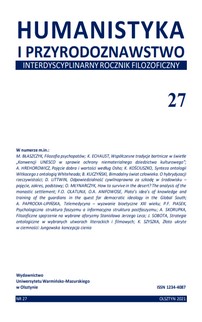EMPATIA PODSTAWĄ MORALNOŚCI – TEORIA MORALNOŚCI DAVIDA HUME’A I ARTHURA SCHOPENHAUERA W ŚWIETLE BADAŃ NEUROBIOLOGII I PRYMATOLOGII
EMPATHY BASIS OF MORALITY – DAVID HUME’S AND ARTHUR SCHOPENHAUER’S SENTIMENTAL THEORY OF MORALITY IN VIEW OF RESULTS OF RESEARCH IN NEUROBIOLOGY AND PRIMATOLOGY
Author(s): Anna KotSubject(s): Ethics / Practical Philosophy, Early Modern Philosophy, 19th Century Philosophy, Behaviorism
Published by: Wydawnictwo Uniwersytetu Warmińsko-Mazurskiego w Olsztynie
Keywords: sentimental theory of morality; resolving moral dilemmas; mirror neurons; empathic behaviour of primates;
Summary/Abstract: In philosophy there has long been a dispute about the basis of morality. Philosophers like Aristotle, Immanuel Kant and John Stuart Mill attribute primary functions in making moral decision to intellect. On the other hand, David Hume and Arthur Schopenhauer emphasize the leading role of emotion. The purpose of this text is the presentation of (a) sentimental theory of morality in view of: 1) a study of the human brain during the resolution of moral dilemmas (Joshua Green), 2) the role of mirror neurons (Giacomo Rizzolatti), 3) observation of empathic behaviour of primates (Francis de Waal). These studies bring new perspectives into ethics, which allows the problem of development of morality to be looked at in a different way.
Journal: Humanistyka i Przyrodoznawstwo
- Issue Year: 2019
- Issue No: 25
- Page Range: 51-70
- Page Count: 20
- Language: Polish

